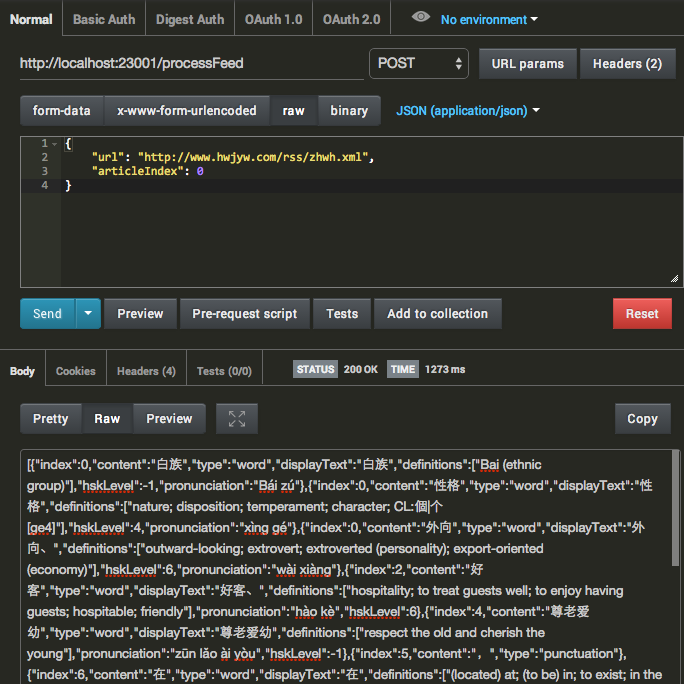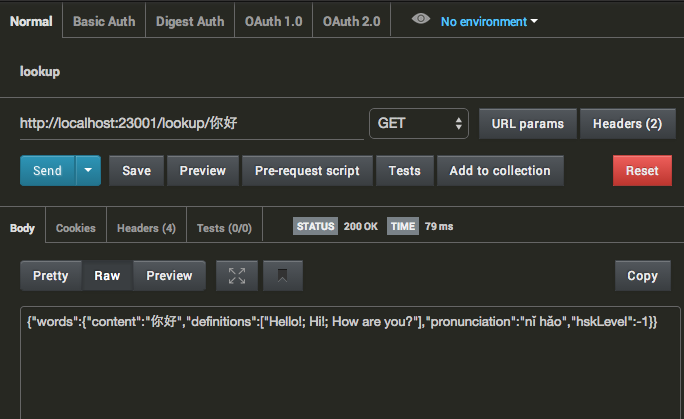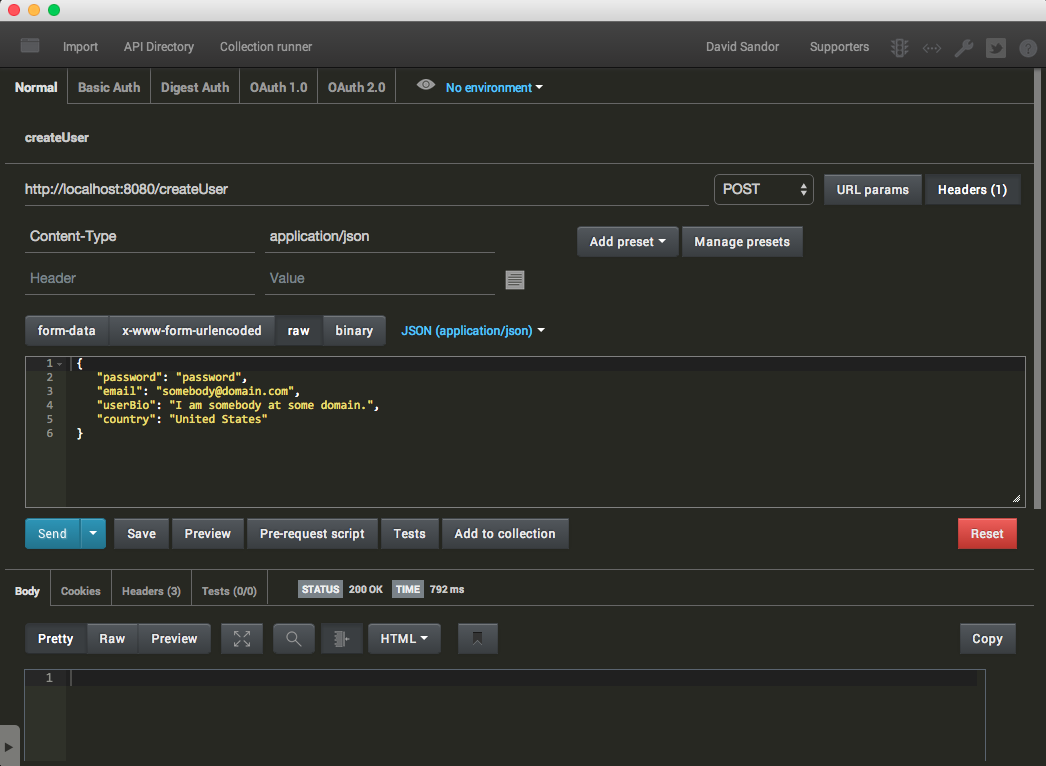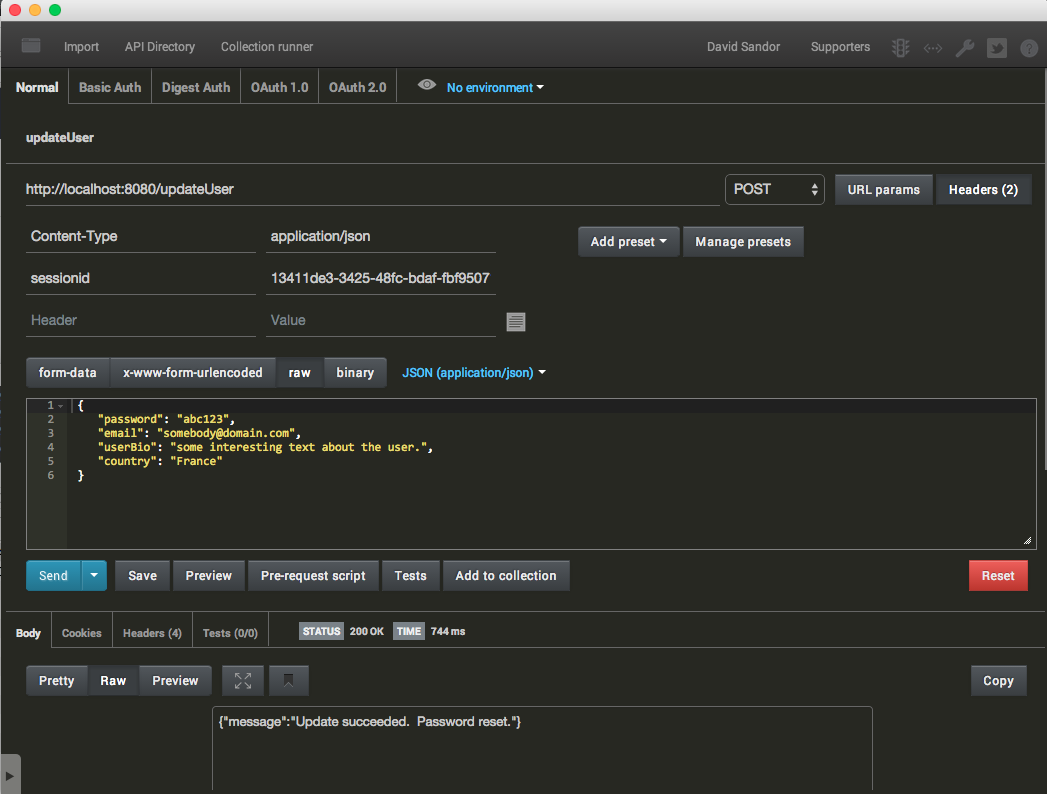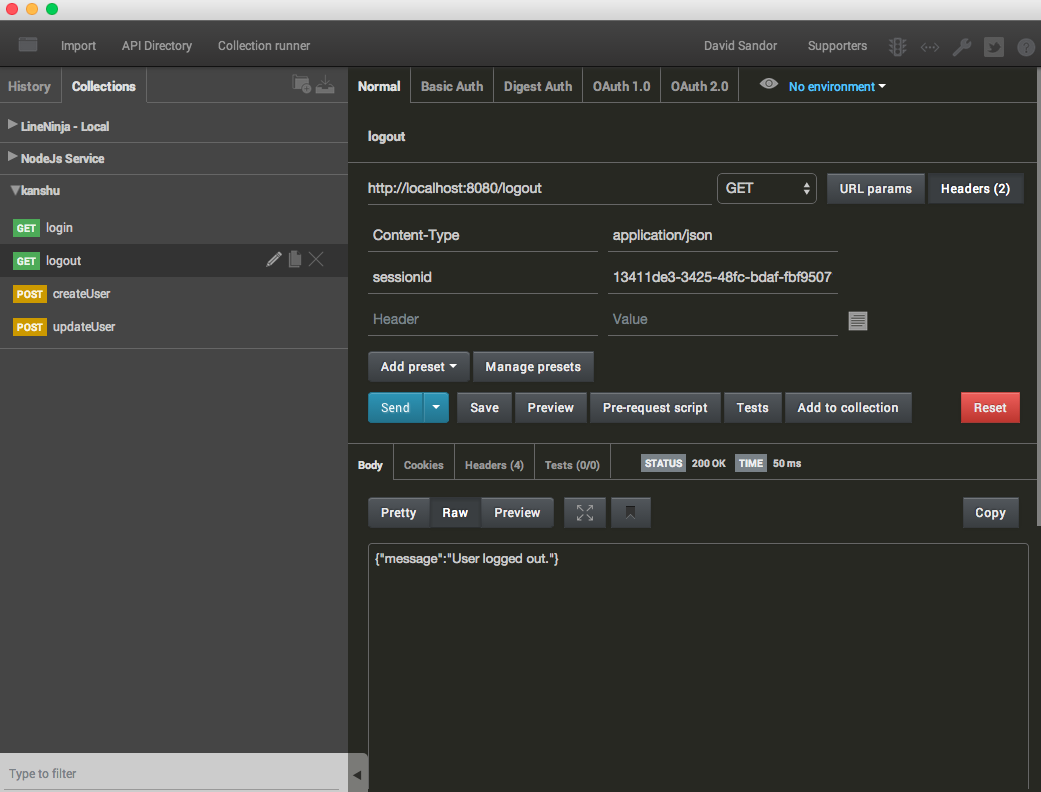kanshu user-metrics api
The user-metrics api provides methods to allow the saving and retreival of user metric data. All of the methods in this API excpect a sessionid HTTP header to authenticate the user.
POST /saveword
This method saves the word to the user's word list. Provide the wordId in a JSON object.
{ wordId: 1 }An HTTP 200 status will be returned if the save is successful.
POST /deleteword
This method deletes a word from the user's word list.
{ wordId: 1 }An HTTP 200 status will be returned if the delete is successful.
POST /linkarticle
This method will link an article to a user.
{ articleId: 1 }An HTTP 200 status will be returned if the link is successful.
POST /markmastered
This method will mark a word in the user's list as mastered.
{ wordId: 1 }An HTTP 200 status will be returned if the update is successful.
GET /getwords
This method gets a list of the words that the user has saved.
[{
"id": Integer,
"translatedto": String,
"traditional": String,
"simplified": String,
"pronunciation": String,
"hsklevel": Integer,
"definitions": [],
"ismastered": Boolean,
"mastereddate": Date,
"saveddate": Date
}]GET /getwordsmastered
This method returns back counts of mastered vs. unmastered words in the user's saved words list.
{
"mastered": Integer,
"unmastered": Integer
}GET /getmasteredbylevel
This method gets the word counts by level that the user has mastered.
{
"level0": Integer,
"level1": Integer,
"level2": Integer,
"level3": Integer,
"level4": Integer,
"level5": Integer,
"level6": Integer
}- Please note that level0 represents words that are mastered but are not listed in the HSK level lists.
kanshu dictionary api
The dictionary api is written in JavaScript and runs on node.js.
Start the service with the following command:
$ node index.jsThis will output a log line like the following:
{"name":"api","hostname":"macmini.devsql.local","pid":9397,"level":30,"msg":"restify listening at http://0.0.0.0:23001","time":"2015-01-29T02:22:30.387Z","v":0}You may wish to edit some configuration settings in the config.json file, it looks like this:
{
"connectionString": "postgres://localhost/kanshu",
"apiServicePort": 8080
}Hopefully these settings are fairly self explanitory.
Configuring the PG database
The table structure is defined in dictionary/node/sql/words_create_script.sql
create table words (
translatedto varchar(8) NOT NULL,
traditional varchar(255) NOT NULL,
simplified varchar(255) NOT NULL,
pronunciation varchar(255),
definition varchar(512),
PRIMARY KEY ( translatedto, traditional, simplified, definition )
);A script to insert all of the words is in the cc-cddict.sql.zip file. This will seed the PG database with 110144 words. The service loads all of these words into an in memory cache at startup for performance.
/processFeed
This is an http POST request.
{
"url": "http://www.hwjyw.com/rss/zhwh.xml",
"articleIndex": 0
}This call will load the RSS feed specified in the url property and will attempt to process the article at the articleIndex ordinal (zero based).
/lookup
This is an http GET request in the format: /lookup/[word]
For example:
http://localhost:23001/lookup/你好/article
This is an http GET request in the format: /lookup/[articleId]
For example:
http://localhost:23001/article/1Returns an article object. [https://gist.github.com/dsandor/b58690b726d5ff792aa5]
/articles
This is an http GET request in the format: /articles/[articleSourceId]/[maxRecords] maxRecords is optional and if not supplied will return all articles for the articleSourceId.
The following example returns the 10 most recent articles for the articleSourceId of 1.
http://localhost:23001/articles/1/10Returns an array of article objects. [https://gist.github.com/dsandor/077a427e6ef516d74ac1]
#kanshu authentication api
The authentication api is written in JavaScript and runs on node.js.
Start the service with the following command:
$ node index.jsThis will output a log line like the following:
{"name":"api","hostname":"macmini.devsql.local","pid":9397,"level":30,"msg":"restify listening at http://0.0.0.0:8080","time":"2015-01-29T02:22:30.387Z","v":0}You may wish to edit some configuration settings in the config.json file, it looks like this:
{
"connectionString": "postgres://localhost/kanshu",
"initialSessionExpirationMinutes": 10080,
"apiServicePort": 8080
}Hopefully these settings are fairly self explanitory.
##/createUser
This is an http POST request and requires no sessionid or authentication in order to be called.
The service will return an HTTP 200 status indicating the user is created. Otherwise an error will be reported as an HTTP 500 status and a JSON error object will be sent in the body of the response.
{ message: 'some error message text' }
##/login
This is an http GET request and must authenticate to the api with basic http authentication. Here are links to accomplish this:
- iOS / Swift http://stackoverflow.com/a/24380884
- Android http://stackoverflow.com/a/8920939
The service will return an HTTP 200 status and the body of the response will contain the sessionid.
{"sessionId":"362d0bae-0fc7-460d-b79a-98c64a4382c3"}
##/updateUser
This is an http POST request. In order to perform this request a sessionid header must exist with a valid session id value that corresponds to the email address in the posted data. The call expects a JSON formatted body to contain an object like the following:
{
"password": "abc123",
"email": "pg.data.unittest@test.com",
"userBio": "some interesting text about the user.",
"country": "France"
}
##/logout
This is a http GET request. The call expects a sessionid header with the session id of the user you want logged out. The call will return an HTTP 200 response if successful.
